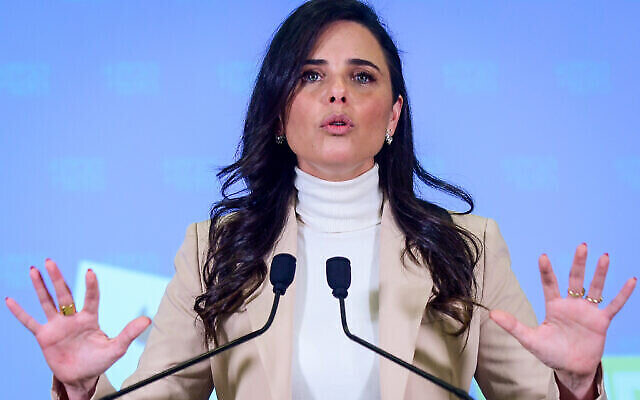Netanyahu headed for decisive comeback victory
Near-complete results give Likud leader’s bloc 65 seats, with far-right set to gain unprecedented sway; landscape could change if Meretz, Balad cross threshold, but unlikely.

As the ballots in the Knesset election were being tallied Wednesday, all signs were pointing to a resounding victory for opposition leader Benjamin Netanyahu and his bloc of right-wing, far-right and religious parties, a result that would end a political crisis that has seen five general elections held in under four years.
With some 86% of the votes counted, the bloc of parties loyal to Netanyahu was predicted to win 65 seats in the 120-seat Knesset, a comfortable majority.
The numbers were expected to shift as officials had yet to begin tallying the so-called double-envelope ballots cast by members of security forces, prisoners, people with disabilities, diplomats serving abroad, and others, but significant change to the balance between Netanyahu’s bloc and its opponents was not seen as likely.
The coalition shaping up to be Israel’s next is made up of Netanyahu’s Likud party, ultra-Orthodox parties Shas and United Torah Judaism parties, and the far-right Religious Zionism party led by Bezalel Smotrich, which includes extremist Itamar Ben Gvir’s Otzma Yehudit faction.
Ben Gvir is seen as the biggest star of the election, having gone from leading a fringe party to becoming a popular leader in a party representing some 10% of Israeli voters.
If the results don’t change significantly, it would mark a stunning comeback for Netanyahu, currently on trial in three corruption cases, and end four years of political stalemates that have dragged the country through a series of elections.

But critics warn that it could also hand power to ultra-nationalists such as Ben Gvir and his political partner Bezalal Smotrich, who could strip Arab citizens of rights, defang the Supreme Court and pass legislation that will do away with Netanyahu’s legal woes, and ratchet up societal divisions.
The critical remaining factor was the fate of the left-wing Meretz party and the hardline Arab party Balad, which were both hovering barely under the 3.25% minimal electoral threshold. Meretz was predicted to get 3.19% while Balad was at 3.01%, meaning that as it stands, both parties will not be in the next Knesset.
The only scenario that could thwart the Netanyahu bloc’s majority is if both Meretz and Balad end up above the threshold and if fellow left-wing Labor party — currently at 3.57% — doesn’t fall below it. Channel 12 pollster Mano Gevo said Wednesday morning that the overall division of seats between the blocs was unlikely to change significantly, although further shifts in party totals were possible.
Hebrew media reported that Prime Minister Yair Lapid’s Yesh Atid party was already preparing for a possible power transition, with Lapid intending to phone Netanyahu as soon as the final results are published, which could take several days.
Facing potential political oblivion, Meretz MK Mossi Raz told Army Radio Wednesday morning: “What we are seeing are partial results. We maintain cautious optimism. We will continue to represent our voters, even if outside the coalition or outside the Knesset.”

Meanwhile, an unnamed senior Labor politician was quoted lashing out against party leader Merav Michaeli following Labor’s apparent poor showing.
The party member said Labor — the ruling party during Israel’s first few decades and a major political force until a few years ago — was saved by party loyalists who voted for Labor despite Michaeli, the Ynet news site reported.
“We expect her to draw the obvious conclusions, otherwise we will send her home,” he said. “It is unbelievable that the Labor Party is struggling to cross the electoral threshold. Merav is a colossal failure and disconnected from reality.”
On the other side of the political divide, Ben Gvir told reporters that he would work for all the people of Israel.
Ben Gvir vowed to be part of a “completely right-wing” government, but added: “I want to say that I’ll work for all of Israel, even those who hate me.”
Earlier in the morning, Netanyahu himself told supporters that he was “on the cusp of a huge victory,” promising a government that would restore pride to Israel and make it strong again.
“If the actual results reflect the exit polls, I’ll set up a national government that will look after all the citizens of Israel,” he told supporters, using a word for that is also used to describe nationalist sentiment.
Speaking shortly before Netanyahu, his chief rival Lapid refused to concede defeat, telling party faithful in Tel Aviv to wait until all votes were counted and saying his Yesh Atid party had secured record levels of support.
“They want politics not based on hate and incitement,” Lapid said of his voters.
One party that fell well below the threshold was Ayelet Shaked’s Jewish Home, which ran with a pro-Netanyahu campaign but was met with little support due to anger among its potential voter base over Shaked having joined the current government that ousted Netanyahu last year after 12 years in power.
Jewish Home only got 1.17% of the votes, according to the non-final results, but a report by Channel 12 news claimed that Shaked running until the end had been coordinated with Netanyahu, in an attempt to increase the general vote count, thus increasing the number of votes needed to pass the 3.25% electoral threshold and potentially helping to sink some rival parties.
On Tuesday night, exit polls from Israel’s major networks gave Netanyahu a clear path back to power, with 62 seats between his Likud faction, the far-right Religious Zionism and the Haredi parties Shas and United Torah Judaism. At least 61 seats are needed to secure a majority and form a government in the 120-seat Knesset.
As pollsters revised their findings and early returns began to come in overnight, the numbers shifted more in Netanyahu’s favour.
Israel has been rocked by political turmoil since a Netanyahu-led government fell apart in late 2018. Two rounds of elections, in April 2019 and September 2019, failed to yield a winner, and a short-lived unity government formed after the third vote in March 2020 collapsed after less than a year.
Starting in June 2021, Lapid’s unlikely coalition, which he helmed with his predecessor as premier Naftali Bennett, managed to push Netanyahu from power after over a decade, but the alliance, which included right-wing Yamina and Islamist Ra’am, struggled to overcome deep ideological divisions and collapsed, partly due to pressure from Netanyahu and his allies.
Times of Israel
Times of Israel staff contributed to this report.

comments